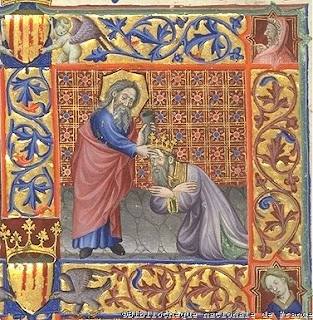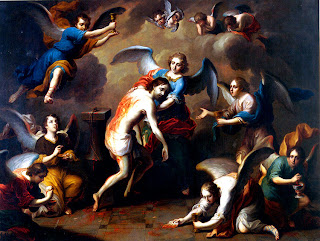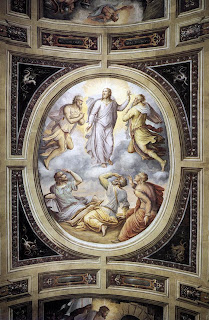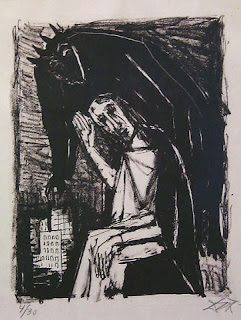 Cuando a lo largo del año litúrgico escuchamos en la Liturgia de la Palabra los relatos de las curaciones que realiza el Señor es natural que nos preguntemos por qué existe el dolor en el mundo, y cuál es el sentido del sufrimiento[1].
Cuando a lo largo del año litúrgico escuchamos en la Liturgia de la Palabra los relatos de las curaciones que realiza el Señor es natural que nos preguntemos por qué existe el dolor en el mundo, y cuál es el sentido del sufrimiento[1].Sabemos por la Revelación[2] y las enseñanzas de la Iglesia que el origen de todas las desgracias de la humanidad es el pecado. Concretamente el pecado original y los sucesivos pecados personales. Sin embargo, esto no quiere decir que cada desgracia o enfermedad tenga su causa inmediata en el pecado personal, como si Dios enviara o permitiera los males en relación directa con cada pecado cometido. Dios no es un sargento con corazón de piedra y con un papel en la mano anotando todos y cada uno de nuestros errores para después castigarlos. Esa es una imagen de Dios tan extendida como equivocada [y perjudicial para la vida espiritual].
El dolor, que acompaña –¡tantas veces!- la vida de las personas buenas, puede ser un medio que Dios envía para purificarse de sus imperfecciones, para ejercitar y robustecer sus virtudes y para unirse a los padecimientos del Señor que, siendo inocente, cargó sobre sí el castigo que merecían nuestras faltas[3].
Paralelamente a éste no entender el sentido del dolor y del sufrimiento en nuestra vida, está la pérdida de la consciencia del pecado. Antes se hablaba de aborto y eutanasia, ahora se habla de interrupciones voluntarias de la vida… Antes se hablaba de adulterio, ahora se habla de aventuras. En otra época se habla de gula y destemplanza, ahora se dice ser gourmet; antes se habla de guerras, hoy de conflictos armados…
Para ambos problemas –es decir, para comprender por qué la existencia del dolor, y para tomar conciencia de lo que significa caminar lejos de Dios- existe una única solución: vivir cerca de la luz. El evangelio nos presenta a Jesús como la Luz del mundo[4] la Luz de los hombres que no solamente da vida a los ojos del ciego, sino que lo ilumina interiormente, llevándole a un acto de fe en su divinidad[5]. Lo escucharemos dentro de unos momentos en el Prefacio de la misa:
Cristo, nuestro Señor, se dignó hacerse hombre para conducir al género humano, peregrino en tinieblas, al esplendor de la fe; y a los que nacieron esclavos del pecado, los hizo renacer por el bautismo y los transformó en hijos adoptivos del Padre.
La invitación del Señor de éste domingo –y decimos invitación porque Dios no fuerza nunca a nadie a nada- es a vivir cerca de la luz, mediante la verdad, el esfuerzo personal, y la vida de la gracia que alcanzamos a través de los Sacramentos[6].
En éste tiempo de preparación hacia el alegre domingo de Pascua y en medio de nuestra celebración eucarística, le pedimos a Dios su ayuda y fortaleza para vivir como hijos de la luz, de cara siempre a la verdad. Y que la Santísima Virgen, Estrella de la Mañana [7]nos ayude en nuestra lucha y en nuestro camino hacia la casa del Padre ■
[1] Homilía pronunciada el 2.III.2008, IV Domingo del Tiempo de Cuaresma, en St. Matthew Catholic Church, San Antonio (Texas).
[2] Cfr Gen 3, 16-19; Rom 5, 12.
[3] Cfr Is 53,4; 1 Pet 2,24; 1 Ioh, 3.5.
[4] A propósito de éste titulo que la iglesia siempre ha dado al Señor, es interesante saber que existe la llama Iglesia "La Luz del Mundo", organización religiosa mundial con sede central en la ciudad de Guadalajara (México). Su nombre oficial es: Iglesia del Dios Vivo, Columna y Apoyo de la Verdad LA LUZ DEL MUNDO A.R. Dice ser la restauración de la primitiva iglesia cristiana fundada por Jesucristo. La iglesia declara predicar e instruir a sus miembros en los altos valores de la paz y el amor a Dios, así como en la fraternidad y el respeto a sus semejantes y a su idiosincrasia, "llevar a cualquier persona sin distinción alguna" el mensaje de la "salvación mediante la fe en Cristo Jesús". La Iglesia está registrada como Asociación Religiosa en México ante las autoridades de la Secretaria de Gobernación a partir del año 1993, año en que se reconoce personalidad jurídica a las iglesias en México por parte de su gobierno. Según la Luz del Mundo, dice tener más de 5 millones de feligreses esparcidos en 42 países alrededor del mundo. El sitio oficial es:http://www.lldm.org/2007
[5] v. 38.
[6] San Agustin lo enseñaba a aquellos que lo escuchaban entrañables palabras: [Señor] Me retenían lejos de ti aquellas cosas que, si no tuvieran su origen en ti no serían. Llamaste y clamaste, y rompiste mi sordera; brillaste y resplandeciste, y curaste mi ceguera; exhalaste tu perfume y respiré, y suspiro por ti; te probé y siento hambre y sed hambre y sed de ti; me tocaste, y me abrasé en tu paz .
[7] Las expresiones Stella matutina, stella Marina, Lux matutina así como stella maris son usadas por San Bernardo a lo largo de sus sermones para explicar el significado del nombre de María, la virgen.
Ilustración: La escena tiene sin duda su centro en los lienzos que envuelven a Lázaro y el gesto de la mano del Señor y la energía que emana del mandato mismo del Señor: Lázaro: sal fuera
Giotto di Bondone, Escenas de la Vida de Cristo. La resurrección de Lázaro (1304-06), Fresco, 200 x 185 cm, Cappella Scrovegni (Padua).









